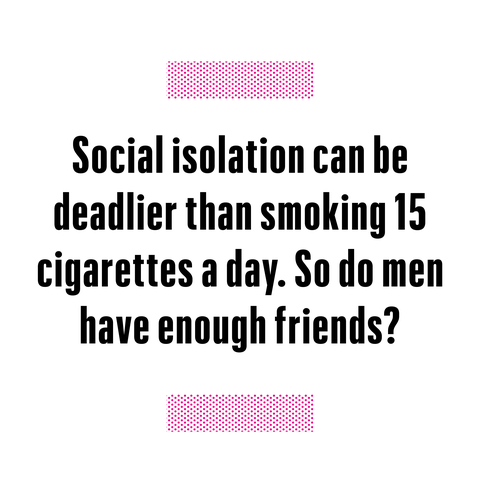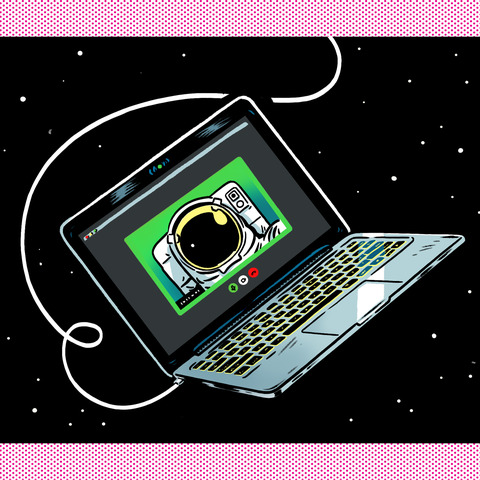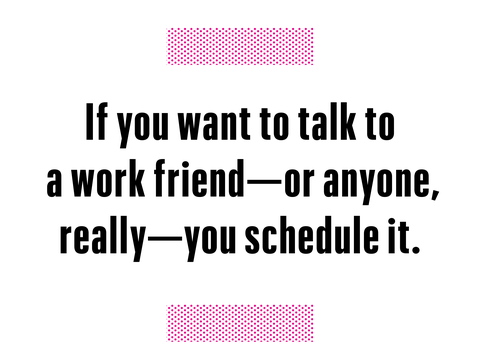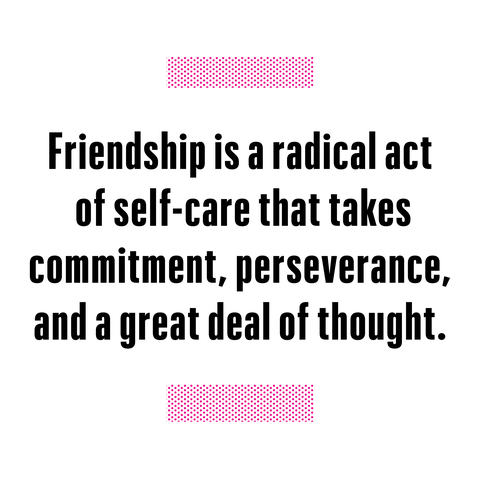This article originally appeared in the December 2020 issue of Men’s Health.
LONG BEFORE 2020 turned life on its head, my wife and a group of her college friends had a tradition. Twice a month, they’d meet at the yoga studio after work, sweat through an hour and a half of vinyasas, then go out for sushi.
These evenings were never about the yoga or the sushi. Over dinner, my wife and her friends would fill each other in on their lives, their work, and their relationships.
Everyone talked; everyone listened. When my wife climbed into bed later, her face was alit. She’d been seen, heard, and loved.
Her reserves were replenished.
I usually spent those evenings at home with our two boys, microwaving enchiladas, washing up, getting them into the bath, putting them to bed. I felt like a modern, supportive man, making space for my partner’s career and social needs. But mostly, I felt alone.

Once the quarantine hit, my wife’s meet-ups went virtual. Like everyone, instead of yoga and sushi, they’d arrange group FaceTimes, looping in friends from out of state. As I read the boys to sleep, my wife would sit in the other room telling stories and laughing.
I wanted friends like that, friends I could trust with secrets and delicate questions. Like, How’s your sex drive?
How’s your rage level these days?
How much do you dribble after you pee?
Still, I couldn’t muster the energy to check in with my guy friends or set up a time to talk. Or maybe I just didn’t. My wife would have supported it—facilitated it, even. But I was feeling low and I was busy, working from home while taking care of the kids and the house. Maybe I told myself that my friends were busy, too.
I went radio silent.
Like most men did.
I tried to be productive. I was exercising a lot. I cleaned out the spice cabinet. I built a bookshelf. Still, as the weeks—then months—dragged on, I started to feel like a caged animal. Outside of my family, my isolation was nearly complete. How many guys like me were out there, coronavirus castaways, lonelier now—working from home, no sporting events to attend, no tap houses to gather in—than ever before?

Much has been written about the importance of male friendship. Research shows men with emotionally intimate male friendships are healthier, have deeper romantic relationships, are more engaged parents, and perform better at work. They also live longer—social isolation is deadlier than smoking 15 cigarettes a day.
So, do men have enough friends?
“We have them—generally as many as women do—but the quality of those friendships are very different, ” says Robert Garfield, a 74-year-old psychologist in Pennsylvania and author of Breaking the Male Code: Unlocking the Power of Friendship.
Garfield, who runs support groups he calls Friendship Labs, told me that COVID-19 is absolutely accentuating problems that already existed in male friendships. Men often do things shoulder-to-shoulder rather than face-to-face. Meanwhile, systemic masculinity has socialized many men out of expressing vulnerability and seeking support from our male friends. All of this has left us poorly equipped to handle the solitude and emotional fallout of a stretch of bad weather, let alone a global pandemic.

“A virus may be taking your job,” Garfield said, “but manhood says that shouldn’t be a problem. A real man will survive. When people get scared and hit like that, they need support. It’s not just going to go away.”
A pre-coronavirus survey from the insurance company Cigna revealed that three out of five Americans were lonely. Those rates were highest among younger men. Another survey from a group called SocialPro, taken at the height of the lockdown in April, found that coronavirus loneliness was highest in the U.S., and has hit millennial men hardest.
So does our pre-exsting loneliness plus pandemic have to equal more loneliness?
Garfield doesn’t think so. He hopes COVID-19 inspires men to get better at making, having, and being friends. “It’s a wake-up call,” he says.

Mark Bagarazzi, a doctor working remotely in biotech from the western Philadelphia suburbs, has developed deeper relationships with his friends during the pandemic by communicating actual feelings.
“People open up over time if you let them,” Bagarazzi says. “And when you open up to them, that feeds it.”
For his sixtieth birthday, in June, his friends gave him a three-hour drive-by and exactly four hugs—but his wife also arranged for people to share video messages with him through a website called Tribute. Many of them reminisced with more intention than they ever would have in person.
For Bagarazzi, who has attended one of Garfield’s Friendship Labs for twenty-five years, the pandemic’s silver lining is the quality of his communications, be they on Zoom or text or from six feet away.

“So far the tradeoff of depth versus face-to-face interactions has been okay with me,” Bagarazzi says. “We’re turning the focus from our day-to-day bullshit lives to: How are we going to survive? Is the world going to survive? The economy?”
Maintaining friendships under quarantine requires action. We’re not bumping into Kevin at the water cooler. If you want to talk to a work friend—or anyone, really—you schedule it. The problem is, the novelty of Zooming with high school friends, kinda fun back in May, has worn off.

The solution? Do it anyway.
In grad school, Nicholas Triolo, a writer and trail runner in Massachusetts, established a ritual of weekly “men’s council” dinners with his two closest friends. Separation has made the tradition less frequent, but the dinners laid the foundation for lasting connection. Still, Triolo has noticed that many of his other male friends stop communicating when faced with depression, heartbreak, or some other turmoil.
“Instead of the natural inclination to double down on the support of their people, they fall off the radar,” says Triolo, 37. “Six months later, I’ll be like, ‘Where’s Eric? Is he dead?’”

Sometime during quarantine, we ran out of yeast. The grocery store had sold out, because the country was stress-baking its way through the pandemic. So I did what everyone was doing and made a sourdough starter. It sounded simple enough. I mixed some flour and water into a paste and left it on the counter to collect the invisible leaveners floating around our kitchen. All I had to do was feed it flour and water twice a day.
I was pretty bad at it. First my starter smelled like old cheese and then paint thinner. It developed a grey scum on top. When I tried baking bread with it the loaves were as dense as bricks.
Sick of scrolling sourdough blogs on my phone, I consulted my friend Alexis, who built her own house out of hay bales. She told me I wasn’t feeding it enough. So I bought a kitchen scale and a 10-pound bag of flour. I fed it non-chlorinated water. I nurtured it. Soon it was bubbling out of its mason jar and I was baking bread, pizza dough, waffles, and cinnamon rolls. Tending to it has become a transformative rhythm to my life, but I had to work at it. I still do.

My friendships are no different. Like many men, I have friends but I don’t spend enough quality time with them. I’m trying to stay better in touch. In the past few months I’ve had deep phone conversations with a friend in New Mexico. I’ve kept up on WhatsApp with my childhood best friend in India. Last weekend I went on a 10-mile trail run with another friend. Recently, a neighbor floated the idea of going fishing.
I might just follow up on that.
This month, three college friends and I gathered in a back yard for dad beers, something we used to do at a brewery. Conversation ranged from a new job to the virus to our kids learning to ride bikes. I told them I was writing this article, and they were interested. They’re a reliable bunch—dedicated fathers and husbands, hard-working and loyal.
Still, I find that when I need a friend the most—when I’m questioning my identity as a writer, putting our dog down, arguing with my wife, or just chafing at the stifling sameness of pandemic life—I’m doing it alone. I blame myself. Something old and deep and broken in me tells me that this is my lot. I suspect my friends feel the same about their struggles. The hardest things go unsaid. When the pandemic stripped away the social noise of our former lives, the truth was revealed: We are islands.
But if the pandemic has been a two-way mirror into the problems of our society—racial inequity, say, our economic fragility, or a growing intolerance of different views—perhaps it can also expose this deepening, festering problem of male loneliness. Friendship, I’m learning, is not some good fortune you stumble into. It’s a radical act of self-care that takes commitment, perseverance, and a great deal of thought. But it will make us better, healthier, happier men. And if anything positive is to come from this pandemic, isn’t that a decent place to start?
Source: Read Full Article
